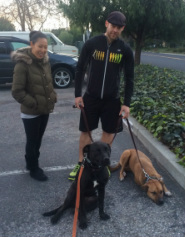
In those early days of rehabilitation when Oliver and I would successfully pass by other dogs I felt an almost overwhelming desire to say "Good boy!". I'm sure I was beaming with pride after those first successes... and equally confused and devastated when it wasn't consistent and the next dog we saw seemed to trigger an even bigger reaction from him.
What's crystal clear to me now is that Oliver wasn't being a bad dog when he was reactive and he wasn't being a good dog when he wasn't. He was simply responding out of fear when he saw other dogs and because he didn't believe that I was in control, showed his fear through barking, lunging, and going a little berserk. The trigger might just as easily have been cars or motorcycles or bags blowing in the wind. It really didn't matter what was making him uncomfortable -- but for him it was dogs as it is for a lot of dogs -- what mattered was how much trust he had in me to be able to take care of it.
Also clear to me now is the impact of "Good dog" in those stressful situations. It's a flood of soft energy towards your dog when what he needs at that moment is to see you in all your strength and confidence. From his perspective, he just completely trusted you to take care of that big scary thing (another dog, a stranger, a paper bag blowing in the wind, you name it!) and if you go all soft and easy he's going to quickly lose confidence... and immediately start showing the bravado that you for some reason stopped!
Here's a stab at an analogy... You're in a bus on the way home from a ski trip down a steep, winding, mountain road in the middle of a winter storm. Half way down the mountain the driver pulls over to let the passengers stretch their legs and you hear him say into his cell phone, "Wow, I'm so glad we're half way down, this is my first time driving the bus in this kind of storm." What's your confidence level in this driver now? How comfortable are you trusting in him? A whole lot less than if he'd exuded confidence and spoke about his experience dealing with just this kind of storm. Right? That's exactly how your dog feels when you show him soft energy -- saying "good dog" is inherently soft by the way ;-) -- right after he just trusted you to be in control. He needs to continue to see you as his pillar of strength all the way home.
Critical But Not Sufficient If he's reacting to stimuli -- out of fear or excitement -- he needs to believe that you've got it under control. And while it's critical that you keep your cool in the moment and exude confidence, it's probably not sufficient. Your dog probably needs to have practiced trusting in your leadership in much lower stress situations: at home holding his Place command while your kids are playing in the next room. No longer barking at the doorbell after you've said, "That's enough, quiet." Waiting for food and going politely through thresholds (in and out of the house, his crate, the car) instead of pushing or rushing you. All of these moments of listening to you and deferring to you inside your house where he's already calmer and more relaxed helps make it much easier for him to listen to you outside the house where he's automatically more excited, more nervous, and much closer to his reactivity threshold when you encounter a trigger that might set him off.
So next time you're out and about and he does stay calm in the face of danger, help him maintain it by continuing to act like nothing out of the ordinary is happening. After all, passing another dog on the street shouldn't be a cause for fear (from him) nor celebration (from you). Save your "Good dog" till you're in the front door and you're giving him that big dose of love that you just couldn't wait to share!
 RSS Feed
RSS Feed